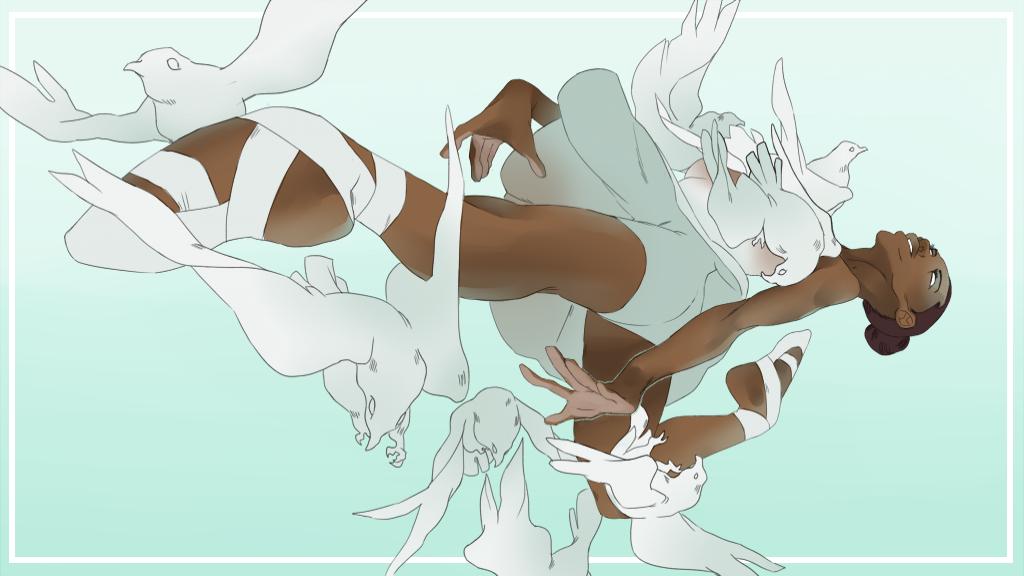Aesha Ash is a professional ballet dancer from Rochester, N.Y. whose impressive resume includes eight years dancing with the New York City Ballet. As one of the few women of color to dance ballet professionally, she frequently found herself misrepresented and faced with stereotypes throughout her career.
In response, she formed the Swan Dreams Project, a photography project that features striking images of herself elegantly dressed in a tutu and pointe shoes on the streets of downtown Rochester. These images are intended to diversify society's definition of beauty and to underscore the ways in which women of color break stereotypes.
Ash formed the Swan Dreams Project in 2011 after retiring from dance. She had retired early to focus on her family, but soon began to grow frustrated.
“I felt like I had given up what I had been fighting for all this time,” Ash said.
She had turned to ballet as a child because she enjoyed the significant challenge it afforded. Not only did she find it more physically and technically difficult than other forms of dance, but she also relished the challenge of being one of the only ballet dancers of color. Now she wanted to take on a new challenge and to change society’s perceptions of women of color, including herself. She recalled an image of black ballet dancer Andrea Long that had stood out to her and inspired her.
“If that image — that singular image — was so powerful for me,” Ash said. “Maybe I can create images that can be powerful for someone else.”
In order to harness the power of imagery, Ash began the Swan Dreams Project in 2011. She donned a tutu and pointe shoes and arranged for a photoshoot on the streets of inner-city Rochester. The resulting photographs — Ash posing in front of a porch full of young people, Ash teaching a pose to two young girls, Ash dancing on a basketball court while a game goes on behind her — highlight her surroundings and the people around her just as much as they highlight Ash herself.
"It's not just a ballet thing, it's a societal issue. It's how society views women of color."
Ash makes it clear that her project is not just intended to attract more black girls and women to ballet, but to also make a statement.
“Oftentimes, what happens is once these kids of color get into a ballet company, [they’ve] been typecast," Ash said. [They’re] either the modern role, or the exotic role, or something a little bit darker, like the warrior princess. It’s not often the fairy or the swan queen or the Juliet ... It's not just a ballet thing, it's a societal issue. It's how society views women of color.”
"We have all these attributes that one would assign to a ballerina and more: the soft, the ethereal, the angelic."
Ash wants her images to touch everyone in her community and challenge the stereotypes of black women that are all too pervasive in our society.
“All the stereotypes and caricatured images that exist for women of color — the ballerina is like the antithesis of that,” Ash said. “And that’s what I want to do, that’s my goal. My mission is to get society to see ... the African-American woman that the media doesn’t often show you. We exist. And we’re not often these hypersexualized characters, loud, vulgar ... We have all these attributes that one would assign to a ballerina and more: the soft, the ethereal, the angelic.”
The community of Rochester has reacted very positively to her project. While taking photographs in front of a bus station in downtown Rochester, a couple moments in particular really stood out to her.
“A gentleman walks by with his chest out and head lifted high. [He said] ‘That’s what I’m talking about, ballerina in the hood,’" she recalled. "I felt like I was his little sister and like he was my big brother, all proud of me. And it made me very proud to be back in my community.”
Ash also recalls talking with a young girl during a shoot and asking her what she wanted to be when she grew up.
“And the little girl looks up at me and she goes, ‘Ballet-princess.’ ... That really stuck with me because she could have said, ‘I want to be a ballerina,’ but she said, ‘a princess.’ That’s how she saw me ... I absolutely loved that. Because that’s what I want people to get. I don’t want them to just be a ballerina, I want them to be everything that that represents. And this little girl got that,” Ash said.
There is still a long way to go in changing the way women of color are perceived in our society, but projects like the Swan Dreams Project are making progress and reminding all of us that beauty doesn’t have a race. To learn more or to buy prints of the project’s photography, visit the Swan Dreams Project's website.








